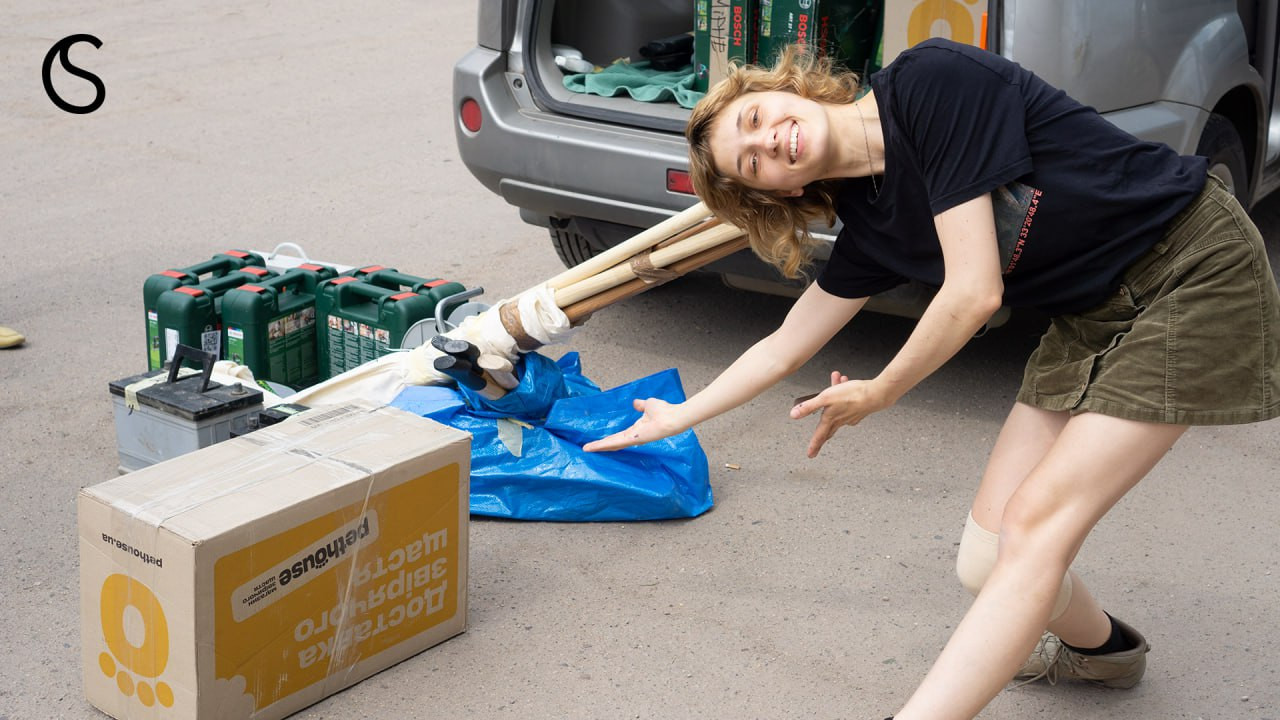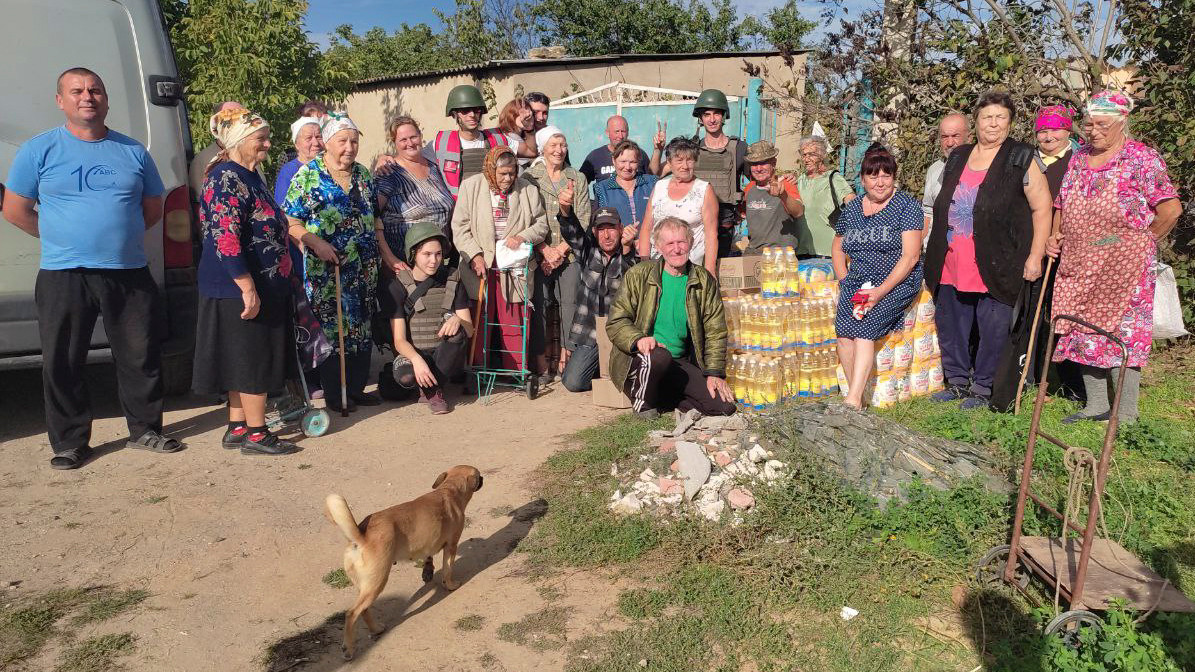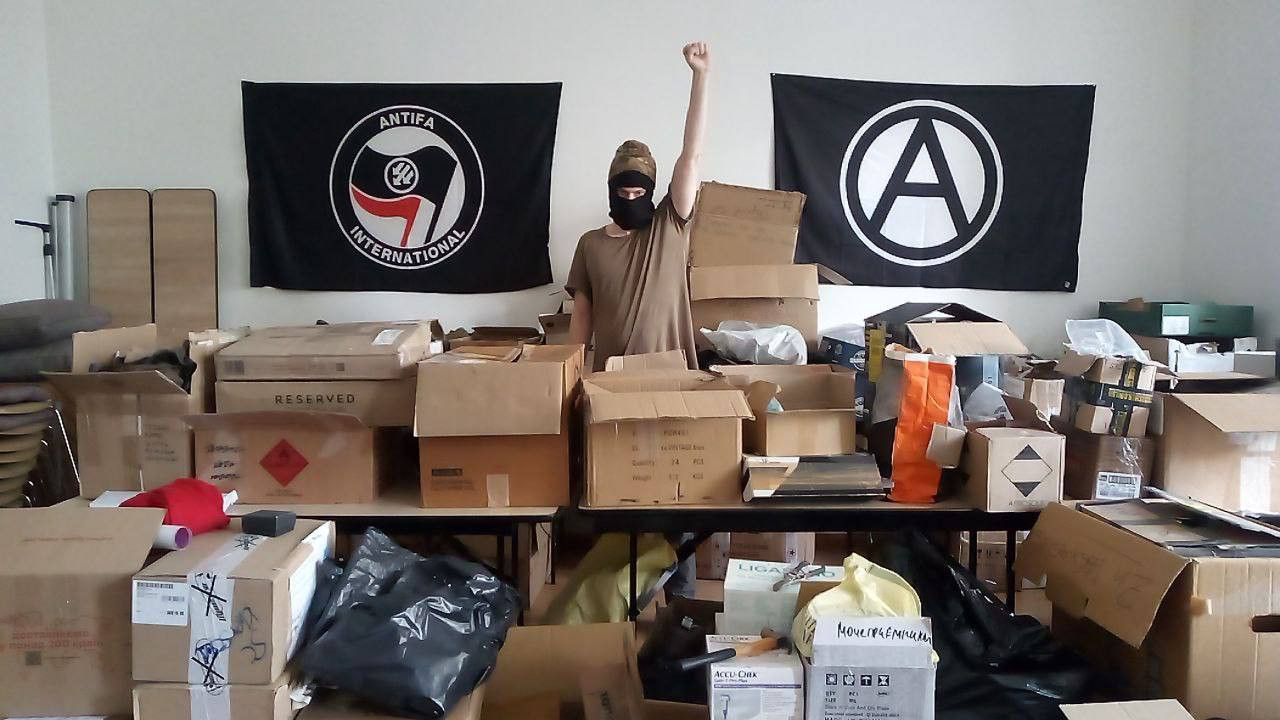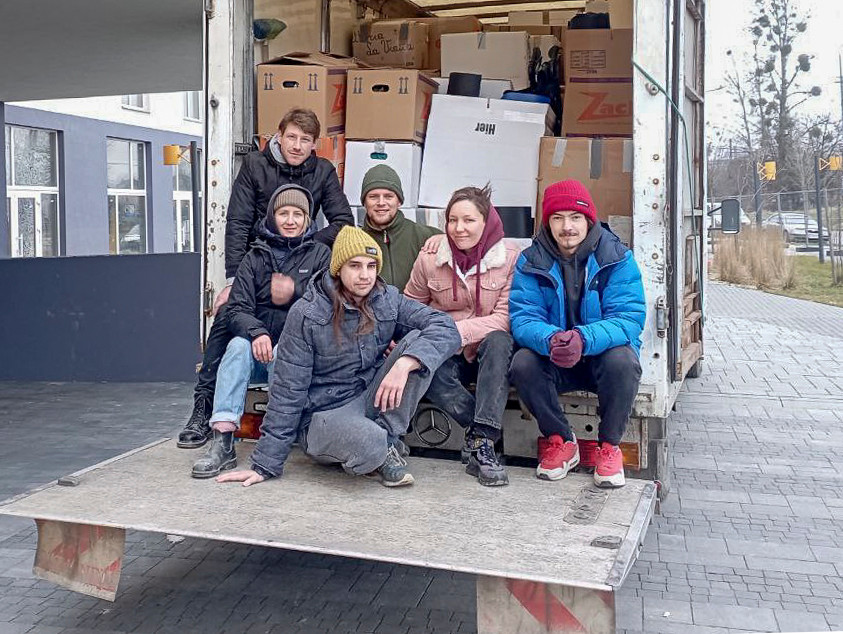Solidarity Collectives
We’re publishing a conversation with Serhiy Movchan from Solidarity Collectives, an international anti-authoritarian network: on direct action in war, obstacles to international solidarity and the prospects for the left movement in Ukraine.

What are Solidarity Collectives? How did the whole thing start?
Solidarity Collectives are an anti-authoritarian volunteer network. As Collectives, we’ve been in existence for more than a year, helping left-wing fighters and civilians affected by the war. However, we have been doing volunteer work of various kinds since the very beginning of the invasion.
The idea of such a network began with an anarchist gathering held a few weeks before the full-scale invasion. At that time, many people didn’t believe that the invasion would actually happen. I didn’t really believe it myself. But a group of comrades who took the threat more seriously decided to develop a plan in case it would happen. In the end they agreed that some of the members would join one of the Territorial Defence units as an anti-authoritarian squad, while the other part would support and sustain the fighters. Initially, almost none of these people had any combat experience or professional equipment. So it was obvious that there would be a need to find support and provide them with everything they’d require.
Another of our tasks was to establish links with the anarchist and international leftist movement in general—to broadcast our vision, our position on what is happening in Ukraine at the moment, to constantly explain why we, as anarchists and anti-authoritarian leftists, decided to take an active part in the resistance to Russian aggression. I have to say that I myself didn’t participate in the meeting just mentioned. But, once the invasion had started, everyone began to act in accordance with the plan developed there: some joined the Territorial Defense of the Obukhiv district in the Kyiv region, and a parallel volunteer initiative emerged as well. At that time, it was called Operation Solidarity, later it evolved into Solidarity Collectives. At the same time, the Resistance Committee was formed, which is an anarchist group operating as part of the Armed Forces of Ukraine and the Territorial Defence. They also conduct ideological work, clarify their position, and publicly talk about their views. We have good relations with them and work together. Not all the anti-authoritarian fighters we support are members of the Committee, however.
How are your activities organized?
The reason we call ourselves Collectives is because our initiative is a large and rather heterogeneous logistical network. This network involves many different initiatives both in Ukraine and across Europe. Our work can start somewhere in Germany, France or Switzerland and end near Bakhmut. At each stage it involves a large number of people, many of whom we may not even know.
Our 'core team' is based mainly in Kyiv and Lviv and has three main lines of action. The first is related to helping the fighters. The work here consists mainly in communicating with them, processing their requests, fundraising, purchasing and shipping supplies that they need. The second line is humanitarian. Most often it involves humanitarian missions to frontline areas and aid delivery: clothes, equipment, medical supplies, food, construction tools. It also involves interaction with local volunteers and various organizations: hospitals and local administrations. There is also a line of action connected with the media, whose main task is to reach out to foreign comrades and voice our position to them, to explain why this war should be understood not as a battle between two imperialisms, but as popular resistance to imperialist aggression.
We started out helping the fighters, and the humanitarian initiative was launched largely accidentally. At some point, a lot of goods were brought to the Lviv warehouse, many of which weren’t needed by the fighters but could be very useful to civilians in frontline areas. And, naturally, we started to deliver these things to them. Recently our humanitarian department has become very active. On average, we go on humanitarian missions every 1.5 or 2 months.

All of our action is coordinated horizontally. Issues that are important for our network on the whole, as well as our guiding principles, are decided on in a general assembly. At the same time, every collective can function independently. In wartime, we don’t have the opportunity to discuss each and every problem together—that would take an undue amount of time and would therefore be highly ineffective. So, responsibilities are distributed equally and in a situation-based fashion: each collective has some freedom to resolve concrete, local issues. For example, those who help fighters decide that they have to purchase equipment of a particular kind for a particular unit. Others can pose them questions, but on the whole no one will actively interfere. Or, in case we post something important for the organization on the whole, the content is discussed in a general assembly, and afterwards no one usually stands against a particular line of argument instead of some other one. Although there are people with completely different backgrounds in our ranks, on the whole everyone understands what they’re doing and why they’re doing it. Action is what is foremost for us—this makes things somewhat easier. We don’t aim to control each and every statement made in our name, and, if there’s some difference of opinion over a particular issue, anyone can express their own vision, however different they may be in each case.
Did the overall attitude towards anarchists and leftists change in Ukrainian society after the outbreak of the full-scale war?
In my opinion, it hasn’t. The fact is that society is mostly unaware of the very existence of anarchists and anti-authoritarian left-wing activists. The anarchist movement in Ukraine is still quite weak and marginal. Unfortunately, anarchists and leftists have failed to create any high-profile and effective unit within the Armed Forces of Ukraine. The anti-authoritarian squad within the Territorial Defence Forces fell apart due to external reasons, its members are not to blame for it. In the end, the fighters found themselves scattered across different units, where they don’t have any noticeable political weight. There are, of course, more prominent figures who manage to gain recognition in the media, but this does not affect the overall situation all that much. And now, in fact, the society doesn’t really care who exactly is on the frontline, what is happening inside the Ukrainian Armed Forces and who holds which political views. In the situation of a people’s war, none of this matters too much. That said, I still consider the presence of anarchist fighters on the front and their participation in combat to be very important. After the end of the war, the question “Where were you then?” will become crucial. And without these people, without their participation, the anarchist movement will have nothing to answer. Obviously, people aren’t fighting on the frontline to gain some kind of moral high ground in the future. They are there because of their hearts' call, because they are ready to sacrifice themselves to stop the occupation. However, from a 'strictly political' point of view, the anarchist movement in Ukraine simply has no future without their presence on the frontline. Apart from combat, they play a very important role in keeping alive the anarchist and the leftist movement in our country as such.
Do you think these international solidarity networks can be maintained after the war? And will they be able to influence the post-war political landscape not only in Ukraine but also beyond its borders?
Developing and preserving these networks of solidarity and communication is one of our main aims. And a very big problem is that such networks didn’t exist before. Had they been in place when the invasion started, there would have been a lot less misunderstanding and questioning and more support and solidarity. We are trying to develop these networks inside Ukraine as well, because we’ll have to live and work here in the future. But to be honest, in the West there is much more interest in the Ukrainian left than there is in Ukraine itself. Here, people either have a lot of stereotypes about left-wing ideas or they simply do not notice us. But we are trying to change this. Each of our humanitarian trips is also an attempt to build links on the ground, to make friends with local residents and activists, with other volunteer initiatives that are already working in these regions. We didn’t start doing this right away. It’s a fairly fresh idea and now it’s being put to practice. And I think it’s not easy at all, but it’s one of the few correct strategies. Thanks to it, there’s already a feeling that we will be able to enter the post-war situation much stronger and more recognizable, with more contacts, more people who know us and are ready to cooperate with us. We are also actively working with labor unions. Obviously, after the war, social and economic problems will immediately become paramount. And I hope that when we can return to what the left should really be engaged in—not a forced struggle against a neighboring state, but a general struggle against capitalism and social injustice—we will have quite a few allies inside the country.

Volunteer initiatives now provide one of the few platforms where a dialog between people with Russian, Belarusian and Ukrainian citizenships is possible—unlike, for example, the cultural field. Do you think that this environment will be able to preserve and develop the possibility of such dialog in the future, including after the war?
The cultural sphere is extremely competitive, and in the condition of struggle of propagandas and various discourses, it is extremely difficult for people in this environment to hear each other out and reach an agreement. And, unfortunately, many don’t even have any desire to see in people with Belarusian or Russian citizenship anything but enemies and competitors, whatever their real views or actions. Among volunteers, the situation is quite different. People are doing concrete things, regardless of their citizenship and origin. They see the practical benefits of others' actions, they understand why they’re doing it and what they’re doing it for. There are no dividing lines here. Both Belarusians and Russians participate in our initiative on an equal footing with everyone else. There have never been any problems in communication either between us and them, or between them and us, or between them and anyone else. Are there prospects of something more emerging out of this in the future? As always, it’s difficult to say. In my opinion, compared to participation in volunteer initiatives, the presence of fighters of Russian and Belarussian origin on the frontline, on the side of the Armed Forces of Ukraine, will be a stronger and more important factor in the perception of people from these countries in today’s Ukrainian society, which is very traumatized by war. However, even despite that, negative attitudes towards everything Russian, culture and language included, will most likely persist in post-war Ukraine for a long while. Of course, we, as leftists, as internationalists, will be fighting against this. But I’m afraid our efforts will be insufficient, and this trend will probably last for years to come.
As I have already said, there are no disagreements or conflicts with the Russians and Belarusians who are also contributing to our victory. On the contrary, there is a clear sense of the importance of what they’re doing. But there are many other problems, primarily administrative and bureaucratic. Life in Ukraine for these people at the moment is not the easiest. It is very difficult, almost impossible for Belarusians and Russians to get legal authorization to stay here, even if they are fighting on the Ukrainian side. Therefore, any trip outside the country can very often be a one-way ticket for them. They are always checked with increased attention at checkpoints and can be taken in for questioning by the police. And of course, they constantly face xenophobic humor. But this is a trifle compared to the problems that the Ukrainian state creates by completely depriving them of any possibility of legal action. In most cases, they are volunteers—that is, they have no contract, no salary and absolutely no social guarantees, unlike all other combatants who are fighting next to them, sitting in the same trenches and going on exactly the same attacks. Often they don’t even have bank accounts, and there is also a constant risk of deportation. Recently, this almost happened to one of our comrades who had been working with us since the early days as a videographer. Fortunately, we managed to find help, and now he is also a volunteer in the Armed Forces of Ukraine.

In your answer to an earlier question, you already mentioned misunderstandings and obstacles to solidarity. Can you tell us more about these problems?
Obviously, all our activities are only possible because of international solidarity. We feel its power. Our initiative has been active for more than a year only because comrades from all over the world have actively supported us. But at the same time we realize that the scale of their help is not comparable to the potential of the leftist and anarchist movement in the whole of Europe. And in a sense, we continue to exist in a bubble, where there are people and organizations that actively support us, donate us funds or goods, come to us, invite us to participate in various events: lectures, discussions, etc. Yet the situation is very different from country to country: from Poland, where almost everyone supports us, to Greece and Spain, where we are supported by only a minority. Germany stands apart, as the leftist and anarchist movement there is very divided over support for Ukraine and a number of other issues. We have strong backup from various people, initiatives and organizations from Germany. At the same time, we know how negative the attitude of another part of the German left-wing movement is towards us and towards Ukraine on the whole. Of course, it is impossible to change the minds of convinced Stalinists, it is impossible to change the minds of convinced Putinverstehers. But there is still a rather large group of people who don’t fully understand what is really happening in Ukraine. My visit to Germany on the anniversary of the invasion showed well that it’s interesting and important for a lot of people to hear us. They don’t have a clear idea of our realities and are trying to make some sense of the situation. And that is also part of our work. A thorough conversation without whitewashing the Ukrainian state, with honest questions and honest answers helps people to understand why we have now taken this particular position, and often convinces them to take our side.
Heartfelt thanks to A.L.E./Anarchist Solidarity, David Levertov and Stas Serhiienko for their help in preparing this interview.